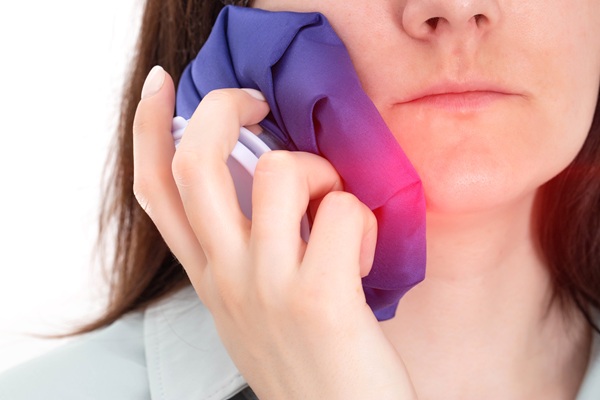What Is a TMJ Disorder?

Disorder of the temporomandibular joint, or TMJ, is a condition that can cause difficulty with jaw functions. The disorder can cause jaw pain that restricts how you open and close your mouth. You might notice clicking sounds or jaw locking when eating, talking or yawning. Continue reading to learn more about the symptoms, diagnosis and treatment of TMJ disorder.
The structure of the TMJ
The temporomandibular joint connects the mandible to the temporal bone of the skull. A small bit of cartilage called an articular disc is present between the two bones. When opening and closing the mouth, the disc moves as the jaw bone rotates and glides back and forth to enable movement.
Different muscles connect near the temporomandibular joint. The muscles allow easy opening and closing of the jaw for talking, eating and other mouth functions. Various ligaments connect the bones to make the joint stable.
Disorders of the TMJ
Symptoms of TMJ disorder often start slowly without connection to specific condition or injury. Patients may experience pain when chewing hard foods. The pain is usually intermittent and often starts after exerting too much pressure on the jaw or when opening the mouth wide, like when yawning. Some of the common causes of the condition include:
- Muscle spasms
- Dislocation of the articular disc in the joint
- Forward head posture
- Teeth grinding or clenching
- Stress
When the jaw joint is subjected to excessive stress, pain and joint movement dysfunction may occur. This may cause inflammation of the joint and muscles around the temporomandibular joint.
Diagnosing TMJ disorder
Anyone experiencing pain in the jaw joint will need to visit a dental professional. The dentist will ascertain the cause of the pain and provide a diagnosis of the condition. TMD diagnosis is mostly obtained through a clinical exam. The dentist may palpate the jaw joint and muscles, checking for tenderness or clicking when opening or closing the mouth.
The dentist will also check the jaw’s range of motion, searching for misalignments. Sometimes, the jaw may open properly on one side and not the other, forcing the jaw to move to one part when opening the mouth. Also, an x-ray may be taken to check for arthritis around the TMJ, and an MRI may reveal the situation of the articular disc in the jaw. After making a diagnosis, the dentist can work toward developing a treatment plan for the patient.
Depending on the patient’s condition, some of the treatment options for TMJ disorder include:
- Medications
- Stabilization splints or bite guards
- Physical therapy
- Dental Botox to reduce tension in the jaw muscles
- Cognitive-behavioral therapy to relieve stress
In rare cases, orthodontic treatment, arthrocentesis and joint replacement surgery might be recommended. The dentist will discuss the benefits and risks of these procedures and continue to monitor the patient during treatment.
Do you think you may be suffering from TMJ disorder?
Some patients with TMJ disorder get better without treatment. However, if you are experiencing symptoms of the condition, it is advisable to visit a dentist for diagnosis and treatment.
Request an appointment here: https://www.dentalexcellencegroupnj.com or call Dental Excellence Group at (201) 244-7244 for an appointment in our Dumont office.
Check out what others are saying about our dental services on Yelp: TMJ Dentist in Dumont, NJ.
Related Posts
Regular checkups and cleanings with a family dentist are important ways to prevent cavities and tooth decay. However, there are effective strategies that can help you protect your teeth and maintain your oral health in between appointments. The following tips from a family dentist can create a proper oral hygiene routine and reduce the risk…
Gum disease develops in stages, and early action protects oral health and overall wellness. This common condition starts when plaque, a sticky film of bacteria, accumulates along the gumline. When not removed, plaque hardens into tartar, which irritates the tissues and triggers inflammation. Without treatment, inflammation can spread into deeper structures, damaging the ligaments and…
If you are undergoing a tooth extraction, you will probably want to replace the tooth as soon as possible with an option like tooth implants. After all, a missing tooth affects the aesthetic appeal of the smile, as well as oral functions. Continue reading to learn how long you need to wait before getting tooth…
Smoking after receiving All-on-4 dental implants can severely compromise healing, reduce implant success rates, and increase the risk of long-term complications. All-on-4 treatment relies on the secure integration of dental implants into the jawbone, a process known as osseointegration. Smoking disrupts this process by impairing circulation, reducing oxygen delivery, and slowing tissue regeneration, which can…
